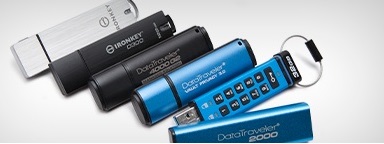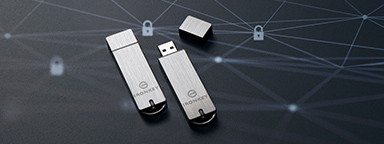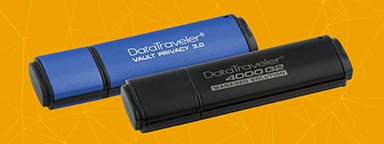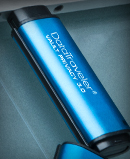Ask an Expert
Planning the right solution requires an understanding of your project’s security goals. Let Kingston’s experts guide you.
We notice you are currently visiting the UK site. Would you like to visit our main site instead?
Your web browser is out of date. Update your browser now for better experience on this site. https://browser-update.org/update-browser.html


With over 24 years of experience in IT security within governments, Tomasz is a leading figure when it comes to information security, personal data and cybersecurity. In his past, he has inspected ICT systems and networks that process classified information and personal data in government administration. He has a security clearance in NATO and the EU.
For several years, he has been the owner of a company specialising in the implementation of secure solutions increasing the security of business information and personal data. As part of this role, he has been carrying out audit activities in various public and private entities throughout EU countries. Furthermore, he is an accomplished advisor in the field of personal data protection, information security, identity theft and cybersecurity, as well as banking secrecy. He was one of the first experts to implement personal data protection in the Polish police.
The constant progress of digitisation has a significant impact on the security of information processed in the digital world. Digitisation not only means technological development but is associated with various types of threats affecting public and commercial entities. It opens gates for hackers who effectively use the weak points of IT infrastructure systems for nefarious purposes, causing sustained commercial and reputational damage to organisations. In 2020, 64% of organisations experienced at least one cybersecurity incident. How can you effectively counter these emerging threats? What counter measures can be taken?
An important issue impacting cybersecurity is the shortage of specialist security experts. More specifically, the industry is lacking the types of qualifications and investment required in IT infrastructure security. According to the report "Cybersecurity Barometer", 58% of the surveyed companies admitted that the pandemic increased the risk of cyberattacks. However, only 23% of them have increased their budgets to ensure security in this area.{{Footnote.A65961}}
These factors have a significant impact on the threat of cybersecurity failures and the resulting risks to organisations. Despite continued reports of data breaches and cyber threats in the news, IT security seems to not be high enough on the agenda for almost 60% of businesses. It’s therefore unsurprising that IT security experts are underutilised by the majority of companies. There are often situations where IT teams do not have the expertise to implement appropriate security strategies. Lack of expert supervision and the use of necessary tools to prevent attacks opens the door to vulnerabilities in wider IT systems. It is apparent that employees are not being given appropriate training in cybersecurity best practices and therefore that their awareness of threats in cyberspace is negligible.
Another area of IT infrastructure that is often forgotten is supervision by data protection officers in the areas of personal data processing. The tasks of the data protection officer have been incorporated into the regulations of the European Parliament and the EU Council. It is an important role to play in ensuring security in IT systems, as data protection officers are responsible for the risk assessment of data processing operations. They must also consider their nature, scope, and purpose.
Many entities do not report any breaches related to hacking attacks, data leakage, data loss or theft. The lack of reports is due to the fear of being held liable under regulations such as GDPR (General Data Protection Regulation). The reporting entities are also afraid of receiving high financial penalties and claims for damages and being responsible for the loss of the company's reputation.
Given today’s heightened risks, IT security should be considered a priority given the unprecedented amounts of data that are being processed and stored. However, the present level of investment in the tools that prevent data loss is insufficient. Despite technological advances in data protection, many organisations have not adapted to what is available and are not equipped with the latest solutions.
An all-too-common example is equipping employees with unencrypted USB drives to store and transfer sensitive data, which is a risk strategy usually determined by cost-saving measures. In the event of data loss or theft, access to this data is not secured in any way. This loss may not only lead to a breach of the company’s data, but it could also affect their reputation and lead to high financial penalties and lawsuits.
Over the past few years, many cases of loss of portable media have been reported. One of the more recent examples in Poland is an incident involving the loss of an unencrypted USB by a probation officer. Subsequently, the office for Personal Data Protection determined that this was due to the lack of appropriate technical and organisational measures put in place. This oversight meant that the level of security did not correspond to the risk of processing data on an unencrypted USB which led to the loss of this data.
Investing in encrypted USBs is prudent and relatively inexpensive when you consider the protection they offer, even if the worst were to happen and the device were to be lost. Not only are you getting a versatile work tool, but also a locked safe that stores data making it inaccessible to any unauthorised individuals.
#KingstonIsWithYou
Was this helpful?

Planning the right solution requires an understanding of your project’s security goals. Let Kingston’s experts guide you.
No products match your current filter selection. Try adjusting your filters to explore more options.

Looking for improved data security & need to know what is encryption? Kingston covers the basics.

Hardware, not software-based password protection, is the best way to protect files and drives.

Secure important personal and private information on a PC with a hardware-encrypted SSD.

Breaches remain a major threat. Explore the need for comprehensive cybersecurity measures.

Here is a list of USB security features to consider for data protection.

Learn what the 3-2-1 data backup method is and why it is your best defence against ransomware.

Learn data security best practices with Dr. Vynckier, and the importance of offline backups.

David Clarke covers encryption, super user safeguards, vulnerability management, and training.

Learn how Kingston IronKey's solutions helped EgoMind enhance their data security hygiene.

Built for disparate purposes, client SSDs and enterprise SSDs have different properties.

We discuss NIS2 and DORA, and how organisations can turn compliance into an opportunity.

We discuss the shifts in how organisations are storing and encrypting sensitive data.

Kingston examines how to secure sensitive files with the increasing vulnerability of email.

Learn how Kingston IronKey hardware-encrypted solutions supports NIS2 Directive compliance.

Kingston IronKey has hardware options to protect small and medium businesses against cybercrime.

FIPS 140-3 Level 3 is certified by the world-leading agency NIST as the apex of encryption.

Questions to ask when seeking the right SSD for your organisation’s data center.

Our infographic showcases the differences between software and hardware-based encryption.

2023 has been a year full of challenges and innovations. But what will 2024 bring?

Learn about two methods that give SMBs superior resilience vs ransomware: encryption and backups.

In this whitepaper, we explain how to enforce a DLP strategy, while allowing USB drive use.

Enterprise-grade and military-grade digital security: two high standards with different requirements.

Learn how hardware encryption can protect a travelling lawyer’s confidentiality with secure file storage.

How is pen testing ensuring Kingston IronKey USB drives lead the way in trusted data security?

Hardware encrypted Kingston IronKey drives protects organisations’ data on the move.

Bring your own device (BYOD) policy is tricky for employers. How to balance security & convenience?

How do encrypted drives improve cybersecurity and compliance for finance companies? Kingston explains.

DLP offers tools for network admins to protect sensitive data from cybercrime and negligence.

A look at how the requirement for data encryption can be key to any organisation's security strategy.

How can we bolster network security with remote working and international travel so common now?

Invest in encrypted drives so you do not incur expensive legal fees if they are lost or stolen.

Discover why national security agencies trust Kingston IronKey to protect their data.

A company’s IT specialists should be expected to add data security to the PCs of remote workers.

Kingston’s three key practices for robust DLP for businesses that handle sensitive data.

You can read and write to an encrypted USB flash drive with an iPad or iPhone with the right adaptor. Here’s how.

Learn why hardware encryption beats software encryption for law firm data protection.

A brief explaining the purpose and types of data security software available.

Passphrases are superior to complex passwords for keeping data secure, with many powerful benefits.

HIPAA requires healthcare organisations to keep patient data safe at all times, including in transit.

This requires encryption of sensitive data, appointing a Security Officer, cyber security programmes and policy adoption.

Kingston IronKey encrypted USBs are a security consideration for organisations of all sizes.

We compare unencrypted and encrypted USB drives and explain how to keep data secure!

Learn how Kingston IronKey is protecting the intellectual property with customisation.

Discover why Kingston IronKey is the go-to solution for protecting financial services data.

Learn how Kingston IronKey is securing the military operations’ data.

How can you get your organisation to use encrypted drives and make them part of your security policy? Here are some tips.

Learn how Kingston IronKey is protecting telecoms industry's data using encryption.

Encryption is an incredibly helpful option for creatives to protect their clients’ important files.

Kingston IronKey encrypted USBs: a small but important part of any organisation’s security strategy.

Kingston IronKey can help mitigate data loss due to the rise in lost electronic devices.

In this eBook, we explore how Encrypted USB drives have become a key tool in keeping data secure.

How to use your IronKey Vault Privacy 80 External SSD: set password, connecting to a PC and more.

Organisations are considering data security options to protect against private mobile data breaches.

Discover how Kingston IronKey is protecting the sensitive data of the finance sector.

Here is how Kingston IronKey helped protect the sensitive data of the Energy industry.

We explore our KingstonCognate experts’ thoughts on cyberthreats and cybersecurity challenges.

Protecting data on the move with superior hardware-based Advanced Encryption Standard (AES) 256.

Users can disable software-based encryption, which can lead to legal fees if the drive is lost.

Don’t plug any USB drives into your computer if you don’t know exactly where they came from.

What we learned from Kingston’s experts and tech influencers on work-from-home enablement Twitter chat.

There are benefits to using both cloud storage and hardware-based encryption.

We explore the top 12 tips small and medium size enterprises can take to enhance cybersecurity.

We’ve examined several factors using unique research to identify what may impact markets globally in 2022.

2021 has been a year full of challenges and innovations. But what will 2022 bring?

Prof Sally Eaves shares her thoughts on the SME cybersecurity landscape and the need for education & support.

Bill Mew shares his thoughts how the largest security challenges need commitment from the boardroom.

Rob May shares his thoughts on how close we are to edge computing and the security it requires.

The pandemic has increased internet traffic, which has placed importance on the role of data centers.

The use of DLP software, VPNs, Encrypted SSDs and USBs, will help mitigate some risks of remote working.

Cameron Crandall of Kingston helps you decide if you should move to your server storage to NVMe SSDs.

There are many advantages to using a dedicated hardware encryption processor in USB flash drives.

What will 2021 bring in Tech and trends? What do our KingstonCognate members and industry experts predicting for the future?

Cyber security and data privacy are everyone’s responsibility. What are the key considerations?

Learn why the future of business depends on SSD-enabled SDS, and how SSD fits into a Software Defined Storage Solutions.

Kingston & Matrix42 partnered to give optimal endpoint security solution in multiple sectors to mitigate risks.

The importance of organisations to consider Revenue, Profit & Risk as equal in organisations to ensure they mitigate data security & cyber security risks. Read this article from Industry Expert, Bill Mew & he will provide you with an insight on this topic.

What do industry experts think has changed since the introduction of GDPR?

Data centres should be using server SSDs. There are many benefits over client drives and costs have come down.

NVMe is now the standard protocol for SSDs to empower data centres and enterprise environments.

Cloud and on-premise data centre managers can learn a lot from supercomputing.

Find out how Hardwareluxx were able to manage the growth of their web traffic using Kingston's DC500M SSD.

SDS hasn’t lived up to its hype but now that NVMe is more affordable, the commodity hardware is ready to deliver.

Choosing the right SSD for your server is important since server SSDs are optimized to perform at a predictable latency level while client (desktop/laptop) SSDs are not. These difference result in better uptime and less lag for critical apps and services.

To work from home you need a good workspace for your PC, the right conferencing gear, and a secure connection.

What strategies can organisations use to best secure customers data in a post-GDPR world with the ever-evolving nature of cyber security threats? Kingston pooled the knowledge of some of the UK’s most experienced commentators in cyber security to discuss how data protection has changed since the introduction of GDPR.

This whitepaper demonstrates how using Kingston Technology’s Data Centre DC500 SSDs can reduce your overall capital and licence costs by 39%.

You already know that remote working is a business enabler. But the challenges posed to your network security and compliance with GDPR are too big to ignore.

How to enable and disable Microsoft’s BitLocker eDrive feature to leverage hardware encryption on your Kingston SSD.

Some of Kingston and IronKey's Secure USB Flash drives are powered by partners, licensed technology, or services.

256-bit AES hardware-based XTS block cipher mode encryption is used in DT 4000G2 and DTVP 3.0.

Firmware/hardware PFAIL protection is an highly effective method for preventing data loss in enterprise SSD.

Kingston datacenter SSDs provide excellent resiliency to protect sensitive data in OLTP workloads.

HPC can require massive amounts of data. SSDs consume a fraction of the power of their spinning disk.

End-to-End Data Protection protects customer’s data as soon as it is transferred by the host system to the SSD, and then from the SSD to the host computer. All Kingston SSDs incorporate this protection.

This program offers the options most frequently requested by customers, including serial numbering, dual password and custom logos. With a minimum order of 50 pieces, the programme delivers precisely what your organisation needs.

Everyday working life has changed radically and so have traditional ways of working: thanks to mobile storage media, we can access our data practically at any time from any location, and can work on our data wherever we are.

Most IronKey and Kingston secure USB flash drives are FIPS 140-2 Certified.

Heathrow Airport in London (30 October 2017) uses unencrypted USB drives for its non-cloud storage. Unfortunately, it was not standardized on encrypted USB drives.

Storage can be the most challenging component for VDI performance.

Testing is a cornerstone of our commitment to deliver the most reliable products on the market. We perform rigorous tests on all of our products during each stage of production. These tests ensure quality control throughout the entire manufacturing process.



